| Srl | Item |
| 1 |
ID:
080841


|
|
|
|
|
| Publication |
2008.
|
| Summary/Abstract |
The United States' unipolar moment is over. International relations in the twenty-first century will be defined by nonpolarity. Power will be diffuse rather than concentrated, and the influence of nation-states will decline as that of nonstate actors increases. But this is not all bad news for the United States; Washington can still manage the transition and make the world a safer place
|
|
|
|
|
|
|
|
|
|
|
|
|
|
|
|
| 2 |
ID:
099374
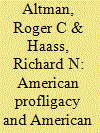

|
|
|
| 3 |
ID:
065458
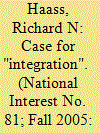

|
|
|
| 4 |
ID:
048078
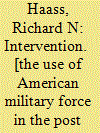

|
|
|
|
|
| Edition |
rev ed
|
| Publication |
Washington, Carnegie Endowment for International Peace, 1999.
|
| Description |
xii, 295p.
|
| Standard Number |
087003135X
|
|
|
|
|
|
|
|
|
|
|
|
Copies: C:1/I:0,R:0,Q:0
Circulation
| Accession# | Call# | Current Location | Status | Policy | Location |
| 042420 | 341.584/HAA 042420 | Main | On Shelf | General | |
|
|
|
|
| 5 |
ID:
119661
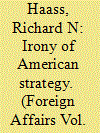

|
|
|
|
|
| Publication |
2013.
|
| Summary/Abstract |
A decade ago, when the wars in Afghanistan and Iraq began, the United States chose to immerse itself in the greater Middle East when it had little reason to dive in. But now that most Americans want little to do with the region, U.S. officials are finding it difficult to turn away.
|
|
|
|
|
|
|
|
|
|
|
|
|
|
|
|
| 6 |
ID:
074930


|
|
|
|
|
| Publication |
2006.
|
| Summary/Abstract |
The age of U.S. dominance in the Middle East has ended and a new era in the modern history of the region has begun. It will be shaped by new actors and new forces competing for influence, and to master it, Washington will have to rely more on diplomacy than on military might.
|
|
|
|
|
|
|
|
|
|
|
|
|
|
|
|
| 7 |
ID:
062772
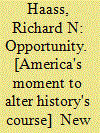

|
|
|
|
|
| Publication |
New York, Public Affairs, 2005.
|
| Description |
xi, 242p.
|
| Standard Number |
1586482769
|
|
|
|
|
|
|
|
|
|
|
|
Copies: C:1/I:0,R:0,Q:0
Circulation
| Accession# | Call# | Current Location | Status | Policy | Location |
| 049772 | 327.73009051/HAA 049772 | Main | On Shelf | General | |
|
|
|
|
| 8 |
ID:
059314


|
|
|
| 9 |
ID:
062453
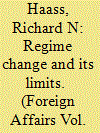

|
|
|
|
|
| Publication |
Jul-Aug 2005.
|
| Summary/Abstract |
So far, the Bush administration has shown it would like to resolve its problems with North Korea and Iran the same way it did with Iraq: through regime change. It is easy to see why. But the strategy is unlikely to work, at least not quickly enough. A much broader approach -- involving talks, sanctions, and the threat of force -- is needed.
|
|
|
|
|
|
|
|
|
|
|
|
|
|
|
|
| 10 |
ID:
027106
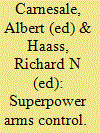

|
|
|
|
|
| Publication |
Cambridge, Ballinger Publishing Company, 1987.
|
| Description |
x, 380p.
|
| Standard Number |
0887302289
|
|
|
|
|
|
|
|
|
|
|
|
Copies: C:1/I:0,R:0,Q:0
Circulation
| Accession# | Call# | Current Location | Status | Policy | Location |
| 030103 | 341.734/CAR 030103 | Main | On Shelf | General | |
|
|
|
|
| 11 |
ID:
065593
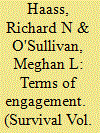

|
|
|
| 12 |
ID:
135199
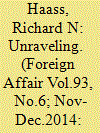

|
|
|
|
|
| Summary/Abstract |
In his classic The Anarchical Society, the scholar Hedley Bull argued that there was a perennial tension in the world between forces of order and forces of disorder, with the details of the balance between them defining each era’s particular character. Sources of order include actors committed to existing international rules and arrangements and to a process for modifying them; sources of disorder include actors who reject those rules and arrangements in principle and feel free to ignore or undermine them. The balance can also be affected by global trends, to varying degrees beyond the control of governments, that create the context for actors’ choices. These days, the balance between order and disorder is shifting toward the latter. Some of the reasons are structural, but some are the result of bad choices made by important players -- and at least some of those can and should be corrected.
|
|
|
|
|
|
|
|
|
|
|
|
|
|
|
|
| 13 |
ID:
149626
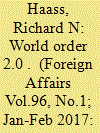

|
|
|
|
|
| Summary/Abstract |
For nearly four centuries, since the Peace of Westphalia [1], which ended the Thirty Years’ War, the concept of sovereignty [2]—the right of nations to an independent existence and autonomy—has occupied the core of what international order there has been. This made sense, for as every century including the current one has witnessed, a world in which borders are forcibly violated is a world of instability and conflict.
|
|
|
|
|
|
|
|
|
|
|
|
|
|
|
|